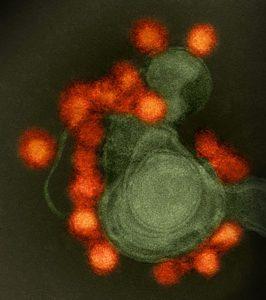
Transmission electron microscope image of negative-stained, Fortaleza-strain Zika virus (red), isolated from a microcephaly case in Brazil. (NAID, Wikimedia Commons)
As of November 2017, there are 7 potential Zika vaccines consisting of one mRNA, one peptide, one recombinant viral, two DNA and two inactivated viral vaccines. Women of child-bearing age are the WHO’s main vaccination target to prevent transmission of Zika to newborns. Consequently, future vaccines would be required to have no safety concerns and side effects during pregnancy, making DNA vaccines an ideal vaccination platform as the vaccine is non-replicating.
Tebas et al. conducted a phase 1 trial of the DNA-vaccine GLS-5700 in the United States of America and Canada. GLS-5700, manufactured by VGXI, contains plasmid pGX7201 which encodes Zika virus (ZIKV) premembrane and envelope proteins. The trial aimed to determine vaccine safety and immunogenicity, as well as compare two vaccine dose strategies.
The trail administered 3 injections of GLS-5700 –four weeks and eight weeks apart- at a concentration of 1-mg or 2-mg per dose. Study participants experienced no serious adverse events. Tebas et al observed a low rate of systemic adverse reactions with the exception of local reactions at the injection site. Upon completion of the vaccination strategy, ZIKV-specific antibodies were observed in all participants. Surprisingly, vaccinees who received low (1-mg) and high (2-mg) vaccine dose induced similar titres of ZIKV-specific and neutralizing-antibodies.
Tebas et al. used a mouse model to determine the in vivo protective ability of vaccine induced antibodies. Saline (control) or vaccinee serum obtained either at baseline or after vaccination completion was transferred to seven mice/vaccinee. This was followed by challenging mice with live ZIKV virus (ZIKV-PR209). They observed a high survival rate of 92% after ZIKV infection in all the mice that were pre-treated with vaccinee serum.
In summary, Tebas et al. reported results of the first completed phase I Zika vaccine trial in humans (to our knowledge). The tested DNA-vaccine, GLS-5700, reported low safety concerns and induced ZIKV-antibody (human) responses that were able to prevent establishment of ZIKV infection in an in vivo mouse model.
Journal Article: Tebas et al. 2017. Safety and Immunogenicity of an Anti–Zika Virus DNA Vaccine — Preliminary Report. The New England Journal of Medicine.
Article by Cheleka AM Mpande











